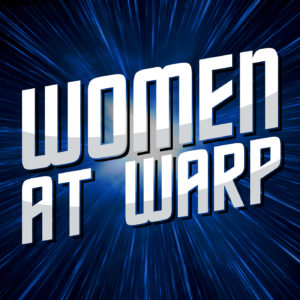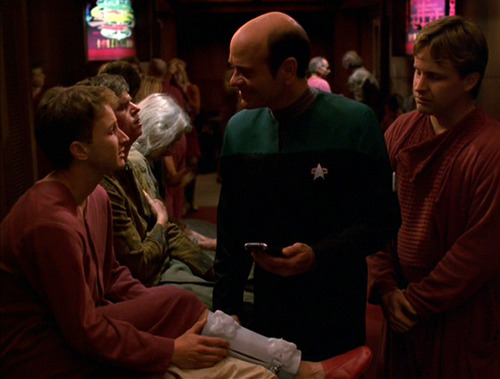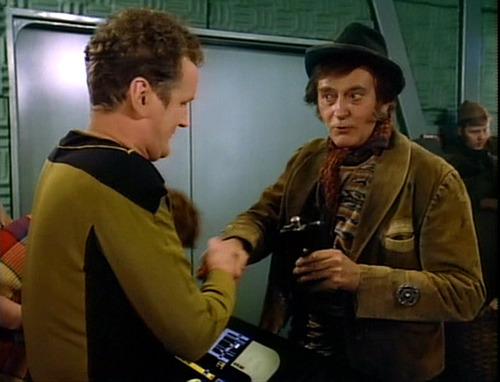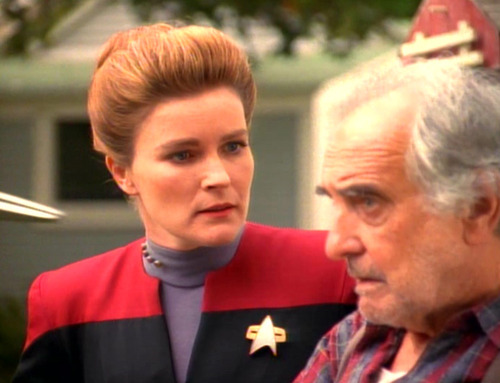Captain Janeway has a story to tell her crew. On the eve of the millennium, her ancestor, Shannon O’Donnell, a famous astronaut, is flown into Indiana by the governor on a private plane to work on the Millennium Gate. And the rest is history.
Not your typical Star Trek episode, and others have pointed out the inconsistencies it creates in canon, but “11:59” is an experiment that I think mostly works.
Just to start, it lets Kate Mulgrew show more range, inhabiting a character that is like Captain Janeway, but decidedly not Captain Janeway.
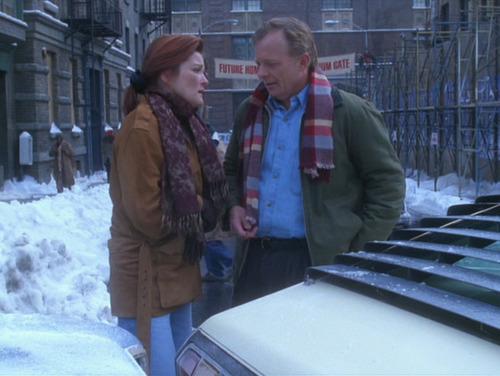
For one thing, she doesn’t really have her shit together. In the first flashback she drives into Portage Creek, Indiana, hoping someone can take a look at her rapidly-breaking-down car. She gets distracted in an intersection and rear-ends the guy in front of her. He asks for her insurance and she doesn’t have any, nor does she have money to pay him for the damage.
So right away we have a contrast not just between Kathryn Janeway and Shannon O’Donnell, but between the O’Donnell flashback and what Janeway has been told about O’Donnell. The broken-down station wagon is no private plane. And this woman driving without insurance, without really even having money for gas or food, walking hunched with her hands in her pockets does not sound like the woman astronaut who helped build the Millennium Gate.
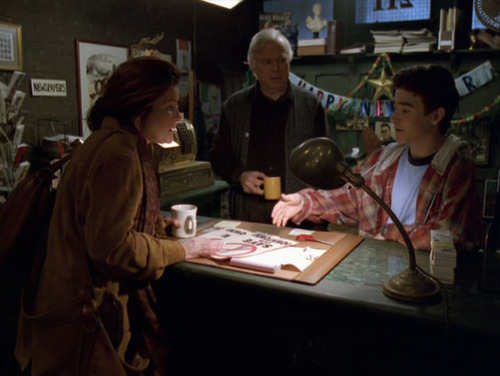
O’Donnell ducks into a shop to wait for her tow truck and meets Henry Janeway and his son, Jason. Henry is campaigning against the Millennium Gate and O’Donnell offers to help him by using her fancy laptop and email skills to spread the word.
Just Henry Janeway’s last name gives us an inkling of where this is probably going, but there are still questions. How does O’Donnell end up with Janeway, especially knowing how virulently he opposes the construction of the Millennium Gate? And why is Captain Janeway’s understanding of O’Donnell so different from the reality?
(And how does Shannon O’Donnell email people without internet access? Henry is apparently opposed to computers so I doubt he has internet.)
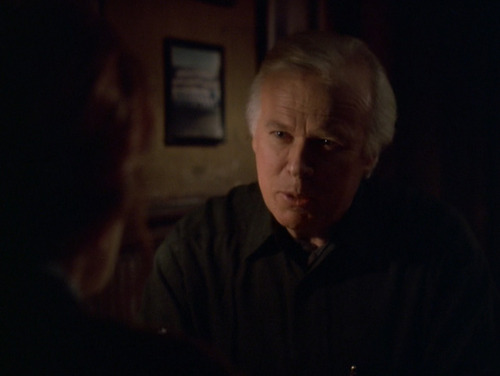
Henry Janeway is established right away as a bookish character who clings to the past and resists technology and change. He’s a little older, not stereotypically masculine, just a genuine, well-meaning man.
Michelle Erica Green did raise a fair point about Henry Janeway: “Stable and centered is one thing, but all those cliches about the good old ancient days – which largely sucked for women, as she should have pointed out – started to drive me bananas.”
Yes, what he was saying about the past was oversimplified, but I think what was more important to me was the dynamic between the two of them. From their first meeting they were able to stand on opposite sides of the fence and disagree respectfully, and even grow to admire and love each other.
Henry might romanticize the past, but we don’t ever see him treating women as less than equal in the present.
So while we’re getting this backstory, ancestor fever has spread around the Voyager crew. Janeway asks Seven to get the skinny on Shannon O’Donnell and next thing you know, Neelix and Seven are talking how much our ancestors matter:
Seven: He was one of my progenitors. A twenty second century prize-fighter. The Captain encouraged me to investigate my genealogy as well.
Neelix: Well, your ancestors can tell you a lot about yourself.
Seven: Somehow, I doubt Buttercup has much relevance to me.
Neelix: The connection could be deeper than you think. Sven. Seven.
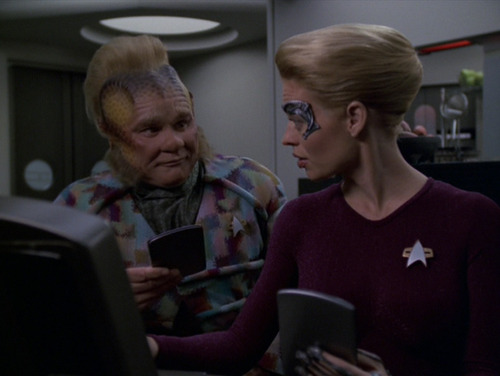
We also get an awesome exchange where Seven shoots daggers at Neelix for suggesting she shouldn’t rule out having kids.
Neelix: The point is, there’s some of him in you. Just as there’ll be some of you in your descendants.
Seven: If I choose to procreate.
Neelix: I wouldn’t dismiss it so lightly. Someday you may enjoy a little Seven of Nine-point-five running around (sees her expression). Or not. Or not.
It is seriously one of my goals in life to duplicate her expression. The next time my mom brings up my “biological clock”, I’m totally going to pull a Seven on her.
Anyway, back to the bigger conversation Neelix and Seven were having. The episode seems pretty much on Neelix’s side: ancestors are important because part of them is in you. I’m generally on Seven’s side; I think if I’m similar to an ancestor that’s probably mostly due to similar socioeconomic conditions, familial traditions and values, not something innate.
But I appreciate the sentiment and what we get to learn about the Voyager characters by the way they relate to their ancestors.
Obviously, the focus is on Janeway, who begins to figure out more of the truth about Shannon O’Donnell after Paris swears up and down he’s never heard of O’Donnell working on the early Mars projects.
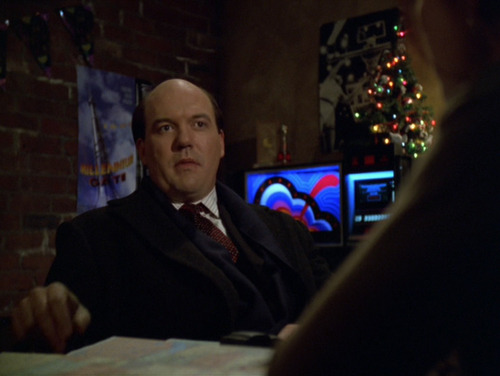
But O’Donnell did have something to do with the Millennium Gate, besides just being in the town. In the flashback we see her meet with the developer, who reveals she was in NASA but “didn’t make the cut” and was then laid off from her more recent job as an aerospace engineer.
Drew Carey’s brother – oh sorry, the developer, Gerald Moss – says he’ll hire her on the project if she can convince Henry Janeway to give up his store so they can build the gate. She says she’ll think about it.
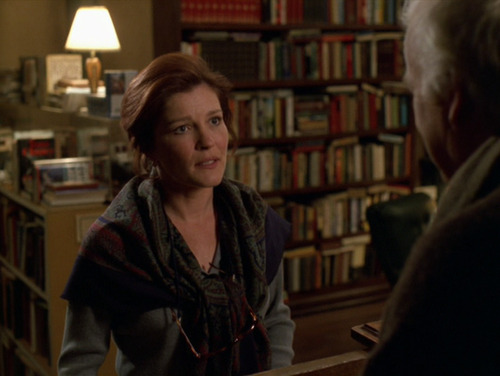
But the next morning (after a cool little conversation with Jason Janeway where she tells him how to beat the game “Matrix of Doom”) she’s honest with Henry about what happened. They fight and my estimation of Henry Janeway definitely goes down a bit when he pulls out the “sleeping with the enemy” line.
O’Donnell: You’re so afraid of change you can barely walk out that front door. The Millennium Gate has a lot of potential, Henry. You just can’t see it. All you can see are these books. You’re living in the past.
Henry: Sounds like you’ve been sleeping with the enemy.
O’Donnell: Having a beer, anyway.
Henry: Moss.
O’Donnell: He offered me a job.
Henry practically begs her to stay but she says she doesn’t want to; she can’t get stuck here.
Moss renews his job offer, even though she wasn’t successful. It’s a little anticlimactic but I think necessary so you know the Millennium Gate isn’t an evil project. She heads out of town in her repaired car, trying to decide whether to head to the new Millennium Gate site, or to Florida to her sister’s.
But she keeps thinking about Henry Janeway and decides to turn around. And they argue, again, but this time he listens to her and they reach a compromise. And yes, it’s cheesy (I had to come back because without you cookies from the gas station just don’t taste good!!!), but gosh darn it, I liked it. Besides, remember we don’t always get couples communicating honestly and openly in Star Trek.
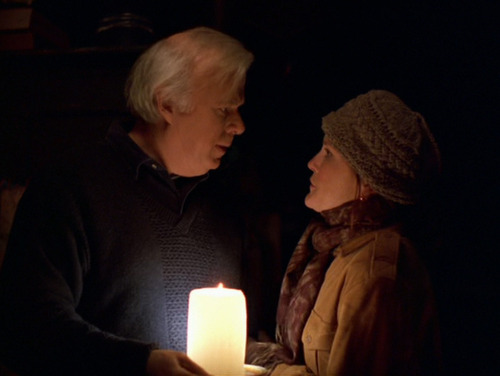
O’Donnell: What have you won? The right to hide behind these shelves for the rest of your life?
Henry: It’s worked so far.
O’Donnell: Well, it isn’t working for your son, or this town, or me.
Henry agrees to give up his store and maybe open one in the new Millennium Gate commercial spaces. And Shannon O’Donnell agrees that she’ll stay with him and if she ever drives away again, they’ll do it together.
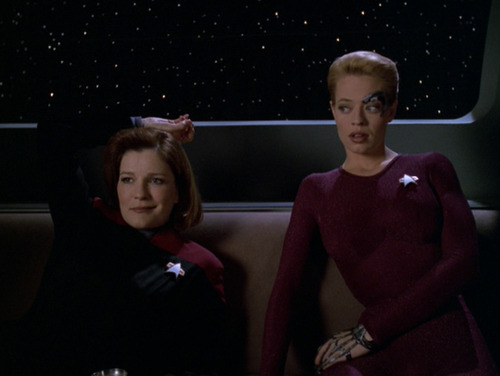
Where does this leave Captain Janeway?
Well, finding out most of the truth, it makes her consider how Voyager will be remembered.
“I’ve gone through dozens of histories written about twenty first century Earth, all of them biased in one way or another. The Vulcans describe First Contact with a savagely illogical race. Ferengi talk about Wall Street as if it were holy ground. The Bolians express dismay at the low quality of human plumbing. And human historians? Exact same story. Every culture saw it a different way. So I go back to the raw material. Birth certificates, death certificates, marriage certificates, census surveys, voter registration forms, housing records, medical, employment, court records. It’s all fragmented and incomplete.”
And though it’s a short moment, hopefully it makes us consider how much of the history we know is complete and objectively true.
Captain Janeway’s also disappointed.
“She married him and changed her name,” Janeway tells Chakotay, “But she certainly never changed history.”
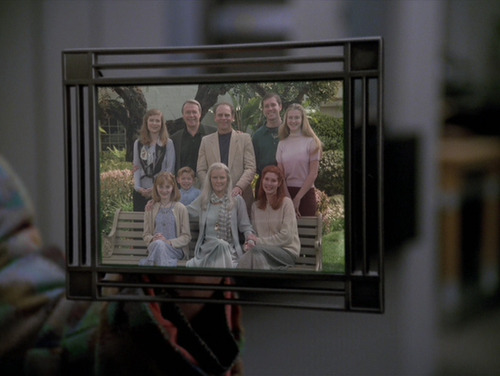
Later, when Neelix gives her a framed photo of Shannon Janeway with her children and grandchildren, she says she’s not sure it deserves a place in her ready room.
What’s interesting is that everyone’s response to that is to say O’Donnell’s real history doesn’t matter; what’s important is that Janeway was inspired by the exaggerations:
Seven: Her life captured your imagination. Historical details are irrelevant.
Tuvok: I concur with that analysis.
Chakotay: If it weren’t for Shannon O’Donnell, you never would have joined Starfleet.
The rest of the ending, where they take a Voyager “family” photo, is sweet.
But it feels a little like Shannon O’Donnell got a raw deal. We learned her story and then everyone decided it didn’t really matter. Sure, she wasn’t an astronaut. But she was still a female aeronautics engineer in the year 2000! As of 2003 in the US, only 11% of the engineering workforce were women. Canada, Australia and the UK have similar numbers of working women engineers. O’Donnell was a consulting engineer on the Millennium Gate and evidently she also raised several children. So I think the Voyager crew should’ve given her a little more credit.
So in summary, “11:59”-type episodes wouldn’t work every week on Star Trek but I think it worked this once. It managed to tell an interesting story, shed light on some of our regular characters, and invite the audience to think about issues like the importance of ancestors and the difficulty of reconstructing history.
Bechdel-Wallace Test: Pass. Janeway and Seven talk about the info Janeway wants on Shannon O’Donnell.
